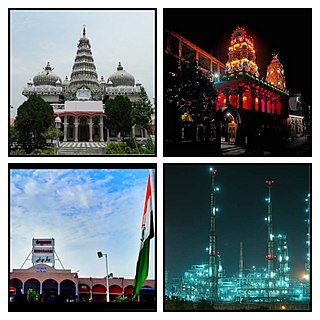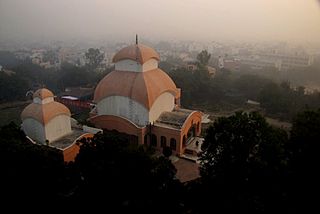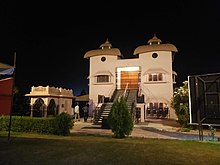
Durga is a major Hindu goddess, worshipped as a principal aspect of the mother goddess Mahadevi. She is associated with protection, strength, motherhood, destruction, and wars.

Durga Puja, also known as Durgotsava or Sharodotsav, is an annual Hindu festival originating in the Indian subcontinent which reveres and pays homage to the Hindu goddess Durga, and is also celebrated because of Durga's victory over Mahishasura. It is celebrated all over the world by the Hindu community, but it is particularly popular and traditionally celebrated in the Indian state of West Bengal, and other states like Bihar, Assam, Tripura, Odisha, Jharkhand, Uttar Pradesh and some other countries like Bangladesh and Nepal.. The festival is observed in the Indian calendar in the month of Ashvin, which corresponds to September–October in the Gregorian calendar. Durga Puja is a ten-day festival, of which the last five are of the most significance. The puja is performed in homes and public, the latter featuring a temporary stage and structural decorations. The festival is also marked by scripture recitations, performance arts, revelry, gift-giving, family visits, feasting, and public processions called a melā. Durga Puja is an important festival in the Shaktism tradition of Hinduism. Durga Puja in Kolkata has been inscribed on the intangible cultural heritage list of UNESCO in December 2021.

Begusarai is the industrial and financial capital of Bihar and the administrative headquarters of the Begusarai district, which is one of the 38 districts of the Indian state of Bihar. The district lies on the northern bank of the river Ganges in the Mithila region of India.

Jagatdhatri or Jagaddhatri is an aspect of the Hindu goddess Durga, worshipped in the Indian state of West Bengal and other states like Odisha and Jharkhand. Jagaddhatri Puja is particularly famous in Chandannagar town of Hooghly district and Krishnanagar of Nadia district in West Bengal where it is celebrated as a five-day-long festival. Her worship and rituals are derived from Tantra. It is believed that her worship frees her devotees from ego and all other materialistic desires.

Hinduism is the second largest religious affiliation in People's Republic of Bangladesh, as according to the 2022 Census of Bangladesh, approximately 13.1 million people responded that they were Hindus, constituting 7.95% out of the total population of 165.15 million people. In terms of population, Bangladesh is the third-largest Hindu populated country of the world, just after the neighboring republics of India and Nepal in the subcontinent. Hinduism is the second-largest religion in 61 out of 64 districts of Bangladesh, but there is no Hindu majority district in Bangladesh.
Kolkata has many festivals throughout the year. The largest and most magnificently celebrated festival of the city is Durga Puja, and it features colourful pandals, decorative idols of Hindu goddess Durga and her family, lighting decorations and fireworks. Other major festivals are Diwali, Kali Puja, Holi, Saraswati Puja, Poush Parbon, Poila Boishakh, Christmas, Eid al-Fitr, Eid al-Adha, etc.

Behala is a locality of South West Kolkata, in the Indian state of West Bengal. Behala is a part of Kolkata Municipal Corporation area. It is broadly spread across Ward Nos. 118, 119, 120, 121, 122, 123, 124, 125, 126, 127, 128, 129, 130, 131 and 132 of the Kolkata Municipal Corporation and is divided into two Vidhan Sabha constituencies: Behala Paschim and Behala Purba. Behala, Parnasree, Thakurpukur, Haridevpur and Sarsuna police stations serve this area under the South West Division of Kolkata Police also known as Behala Division.

Chittaranjan Park is an upscale neighborhood in South East Delhi and home to a large Bengali community. It was established on a rocky terrain in the early 1960s under the name EPDP Colony and later renamed after the deshbandhu (patriot) Chittaranjan Das in the 1980s. Nowadays it is considered among the posh localities in South Delhi due to a rise in the market price of its plots. Despite its growing cosmopolitan nature, it remains home to a large Bengali community and is home to Kolkata-style street-food stalls, Bengali cuisine, fish markets, temples, and cultural centers. It hosts many festivities and cultural events. Durga Puja is the most celebrated festival here which boasts magnificent marquee.

The culture of West Bengal is an Indian culture which has its roots in Bengali literature, music, fine arts, drama and cinema. Different geographic regions of West Bengal have subtle as well as more pronounced variations between each other, with Darjeeling Himalayan hill region and Duars showing particularly different socio-cultural aspects.

Hinduism is the largest religious tradition in the Indian state of West Bengal with approximately 68% of the population identifying themselves as Hindus. The Hindus in West Bengal mostly belong to the Shakta, minority to Vaishnavite and a small community belong to Shaivite and other denominations. The vast majority of Hindus in West Bengal are Bengali Hindus numbering around 55 million and comprising 60.2% of the state population of 91.35 million (2011) but a notable section of non-Bengali Hindus also exist, particularly among Marwaris, Biharis, Odias, Gurkhas, Sindhis, Gujaratis and various tribal communities such as Koch, Santals, Munda and particularly Adivadis numbering around 9.4 million comprising rest 10.3% of the state population. Hindus have decreased in west bengal due to conversion to Islam which National Commission for Backward Classess(NCBC) notices.

Navaratri is an annual Hindu festival observed in honour of the goddess Durga, an aspect of Adi Parashakti, the supreme goddess. It spans over nine nights, first in the month of Chaitra, and again in the month of Ashvin (September–October). It is observed for different reasons and celebrated differently in various parts of the Hindu Indian cultural sphere. Theoretically, there are four seasonal Navaratri. However, in practice, it is the post-monsoon autumn festival called Sharada Navaratri.

Kali Puja, also known as Shyama Puja or Mahanisha Puja, is a festival originating from the Indian subcontinent, dedicated to the Hindu goddess Kali. It is celebrated on the new moon day of the Hindu calendar month of Ashwayuja or Kartika. The festival is especially popular in the region of West Bengal, and other places like Mithila and Anga of Bihar, Jharkhand, Odisha, Assam, and Tripura, as well as the town of Titwala in Maharashtra, along with the neighbouring country of Bangladesh.

Bengali Hindus are an ethnoreligious population who make up the majority in the Indian states of West Bengal, Tripura, Andaman and Nicobar Islands, Jharkhand, and Assam's Barak Valley region. In Bangladesh, they form the largest minority. They are adherents of Hinduism and are native to the Bengal region in the eastern part of the Indian subcontinent. Comprising about one-thirds of the global Bengali population, they are the second-largest ethnic group among Hindus after Hindustani Hindus. Bengali Hindus speak Bengali, which belongs to the Indo-Aryan language family and adhere to Shaktism or Vaishnavism of their native religion Hinduism with some regional deities. There are significant numbers of Bengali-speaking Hindus in different Indian states. According to the census in 1881, 12.81 per cent of Bengali Hindus belonged to the three upper castes while the rest belonged to the Shudra and Dalit castes.
New Delhi Kali Bari is a Hindu temple dedicated to Goddess Kali and the center for Bengali culture in New Delhi, India. Established in 1930s, it is situated on Mandir Marg, close to Laxminarayan Temple in Delhi.

Chittaranjan Park Kali Mandir is a temple complex and Bengali community cultural center in Chittaranjan Park in New Delhi, India. Built on a small hill, it started as a Shiv temple in 1973, which still stands within the complex, the larger shrines dedicated to goddess Kali, Shiva, and Radhakrishna were added in 1984. Over the years it has remained an important centre of convergence of local Bengali community during annual Durga Puja festivities.

Madras Kali Bari is a Hindu temple located in the neighbourhood of West Mambalam in Chennai, India. Dedicated to the goddess Kali, the temple is constructed on the lines of the Dakhshineshwar Kali temple near Kolkata by the Bengali community in the city. Within the precincts of the temple, is a meditation hall where bhajans are sung daily. Bengali festivals like Durga Puja and Kali Puja are celebrated with grandeur.

The Hyderabad Kalibari is a Hindu temple located in the Vivekanandapuram, Neredmet neighbourhood of Hyderabad, 7 km from Secunderabad Railway Station, Telangana,India. The presiding deity of the temple is goddess Kali, hence the name Kalibari or Abode of Kali. The temple is famous for its Kali Puja and Durga Puja which is held on October/November of every year during Dusshera and Diwali.

Sarathi Socio Cultural Trust is a non profit organization in Bangalore, founded in 2003. The organization is involved in organizing socio-cultural events in Koramangala, the highlight being the grand "Durga Puja", which sees at least 150,000 to 200,000 visitors every year, and which got the "Senco Sharod Samman" award for the best ambiance and crowd management in 2018. In 2020, Sarathi used its funds to help many people, like the idol-makers and others, whose livelihoods were badly impacted due to the pandemic.
Kali Bari Chhindwara is a temple dedicated to Goddess Kali and the center of Bengali culture in Chhindwara, India. Established in 1995, the deity in the temple is Maa Kali.

Durga Puja is an annual festival celebrated magnificently marking the worship of the Hindu mother goddess Durga. This festival is the biggest festival in Kolkata.

























